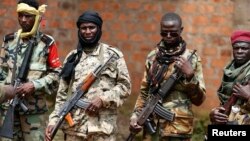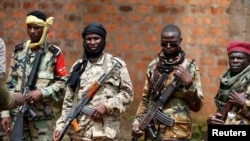Fifty heads of state were invited to London by Prince Charles and British Foreign Minister Willam Hague last month to sign a declaration to stop the $20-billion illegal trade in wildlife. Who are these armed bands of rebels-turned-poachers?
A deputy assistant secretary of state for international narcotics and law enforcement affairs, Brooke Darby, offers a few names.
“There are indeed some links between terrorist groups as well as criminal groups engaged in other types of criminal activities, whether its narcotics trafficking or money laundering, what have you, who are also involved in the wildlife trade," Darby says. "Al-Shabab, the Lord’s Resistance Army, the Janjaweed are among the entities we believe are involved in wildlife trafficking in some way or another.”
Janjaweed and Seleka forces
Rebel forces plunder herds easily within their reach, such as the rhinos and elephants that share their refuge in the jungles of Virunga National Park. But Sudan’s infamous Janjaweed travel great distances to slaughter elephants as far away as Mali, says Patrick Bergin, chief executive officer of the African Wildlife Federation and a member of the president’s Advisory Council on Wildlife Trafficking.
“The situation I’m thinking about is in northern Cameroon in a park there," says Bergin.
"The Janjaweed people on horseback and with arms are going over state borders and moving into different countries and, you know, basically just sweeping into a park area and slaughtering you know 10s or 100s of elephants. Collecting the ivory and being gone again like the wind.”
The Janjaweed raids on Bouba Njida National Park have been going on for years, but with less killing in the past, Bergin said.
“This happened in the last six months,” Bergin said. “It’s not something that could happen very often because the elephant population couldn’t sustain it. The elephant population is not that large to begin with.”
John Calvelli of the Wildlife Conservation Society lists a relative newcomer to the wars of central Africa, the mostly Muslim Seleka force that toppled an elected government in the capital of Bangui and sparked a sectarian war that has claimed thousands of lives and displaced a large percentage of the nation’s population.
Cut off poaching, cut off terror
“We’ve been working in the Central African Republic and Sangha Mbaere for over 20 years," says Calvelli. "One of our scientists has been embedded in that site monitoring this mbaere where literally hundred of elephants come together.
“The Seleka Front was coming through this area and our scientists had to be evacuated. They killed over 26 elephants in the span of a couple of days. It would have been worse but for the actions taken by the Gabonese government and others to help stop that.”
A major wave of poaching has been moving across Africa from west to east and north to south, says Calvelli. Humanitarian groups that track evidence of genocide by armed militias have also seen the trends. Some poliitical activists have joined forces with environmentalists.
Calvelli says, “In Congo, the humanitarian Enough Project sent two researchers to the Garama National Park in Congo to see how Joseph Kony and the Lord’s Resistance Army was funding its activities. They came back from their studies on June 3 of 2013 and said one of the ways we have to stop Joseph Kony is to make the sale of ivory illegal.”
Even rogue units of national armies poach
Many of those interviewed called their charges “anecdotal information,” which reveals how little those who would enforce anti-poaching laws really know what happens deep in Africa’s protected areas. Darby says there is a lot about the dynamics of wildlife trafficking that authorities do not know for certain.
But the U.S. government believes some national armies are guilty of poaching.
“There is actually some evidence of military elements from some countries being involved in this trade,” Darby says. “It’s discussed a little bit in the report that was prepared by the Office of the Director of National Intelligence.
The elephant in the room
“That is something we are concerned about and similarly its corruption that helps to aid this trade. So, dealing with the corruption side of the house is also something we are focused on.
A former U.S. Justice Department prosecutor of wildlife cases, John Webb, says the battle against Africa’s poaching dilemma will have to be fought within Africa’s own government.
“The overarching impediment to effective enforcement against poaching and trafficking is corruption,” says Webb. “And that is – and I know I’m going to make a bad joke here - but that is the elephant in the room.”
A deputy assistant secretary of state for international narcotics and law enforcement affairs, Brooke Darby, offers a few names.
“There are indeed some links between terrorist groups as well as criminal groups engaged in other types of criminal activities, whether its narcotics trafficking or money laundering, what have you, who are also involved in the wildlife trade," Darby says. "Al-Shabab, the Lord’s Resistance Army, the Janjaweed are among the entities we believe are involved in wildlife trafficking in some way or another.”
Janjaweed and Seleka forces
Rebel forces plunder herds easily within their reach, such as the rhinos and elephants that share their refuge in the jungles of Virunga National Park. But Sudan’s infamous Janjaweed travel great distances to slaughter elephants as far away as Mali, says Patrick Bergin, chief executive officer of the African Wildlife Federation and a member of the president’s Advisory Council on Wildlife Trafficking.
“The situation I’m thinking about is in northern Cameroon in a park there," says Bergin.
"The Janjaweed people on horseback and with arms are going over state borders and moving into different countries and, you know, basically just sweeping into a park area and slaughtering you know 10s or 100s of elephants. Collecting the ivory and being gone again like the wind.”
The Janjaweed raids on Bouba Njida National Park have been going on for years, but with less killing in the past, Bergin said.
“This happened in the last six months,” Bergin said. “It’s not something that could happen very often because the elephant population couldn’t sustain it. The elephant population is not that large to begin with.”
John Calvelli of the Wildlife Conservation Society lists a relative newcomer to the wars of central Africa, the mostly Muslim Seleka force that toppled an elected government in the capital of Bangui and sparked a sectarian war that has claimed thousands of lives and displaced a large percentage of the nation’s population.
Cut off poaching, cut off terror
“We’ve been working in the Central African Republic and Sangha Mbaere for over 20 years," says Calvelli. "One of our scientists has been embedded in that site monitoring this mbaere where literally hundred of elephants come together.
“The Seleka Front was coming through this area and our scientists had to be evacuated. They killed over 26 elephants in the span of a couple of days. It would have been worse but for the actions taken by the Gabonese government and others to help stop that.”
A major wave of poaching has been moving across Africa from west to east and north to south, says Calvelli. Humanitarian groups that track evidence of genocide by armed militias have also seen the trends. Some poliitical activists have joined forces with environmentalists.
Calvelli says, “In Congo, the humanitarian Enough Project sent two researchers to the Garama National Park in Congo to see how Joseph Kony and the Lord’s Resistance Army was funding its activities. They came back from their studies on June 3 of 2013 and said one of the ways we have to stop Joseph Kony is to make the sale of ivory illegal.”
Even rogue units of national armies poach
Many of those interviewed called their charges “anecdotal information,” which reveals how little those who would enforce anti-poaching laws really know what happens deep in Africa’s protected areas. Darby says there is a lot about the dynamics of wildlife trafficking that authorities do not know for certain.
But the U.S. government believes some national armies are guilty of poaching.
“There is actually some evidence of military elements from some countries being involved in this trade,” Darby says. “It’s discussed a little bit in the report that was prepared by the Office of the Director of National Intelligence.
The elephant in the room
“That is something we are concerned about and similarly its corruption that helps to aid this trade. So, dealing with the corruption side of the house is also something we are focused on.
A former U.S. Justice Department prosecutor of wildlife cases, John Webb, says the battle against Africa’s poaching dilemma will have to be fought within Africa’s own government.
“The overarching impediment to effective enforcement against poaching and trafficking is corruption,” says Webb. “And that is – and I know I’m going to make a bad joke here - but that is the elephant in the room.”






